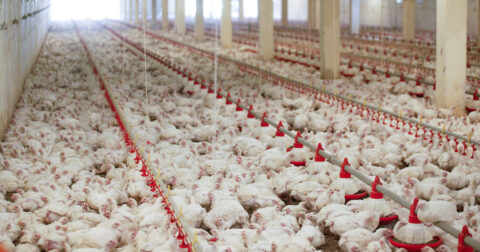Investigation
Oklahoma’s Loophole: How Tyson’s Water Use Goes Unchecked
Food•15 min read
Analysis
A new study released in September by the University of Guelph, Ontario, shows decisively that this genetic manipulation comes at a great physical cost to the birds.


Words by Linda Tyler
Most of the nine billion chickens who are factory-farmed every year in the U.S. never see the sky. They suffer premature deaths by being shackled upside down and electrocuted. As unnatural as their living and slaughter conditions are, their own genetic condition may be even worse. As a result of a half-century of selective genetic breeding, today’s chickens gain weight so fast, especially in their breasts, that they often suffer from cardiovascular problems, muscle deformities, lameness, and external sores. Confined not only in windowless buildings for their whole lives, chickens are also trapped in their own painful bodies.
A new study released in September by the University of Guelph, Ontario, shows decisively that this genetic manipulation comes at a great physical cost to the birds. The Guelph research, which took two years to complete, involved 16 different chicken breeds, each growing at different rates. The study finds that the fastest-growing chickens, compared to slower-growing breeds, spend significantly more time sitting, leading to increased foot and leg sores and reduced ability to maneuver over obstacles or stand in one place. The fastest-growing birds also have high biomarkers for muscle damage, and the meat from these birds shows a significantly higher incidence of “wooden breast,” a condition of muscle hardening and paleness that can lead to the meat being downgraded or condemned. The study shows conclusively that, in comparison to breeds with slower growth rates, faster-growing birds struggle with physical problems related to movement, external injuries, and internal deformities.
While many smaller studies over the last 20 years have reported on individual aspects of chicken welfare problems, the Guelph study is the most comprehensive of its kind to date. But whether the study’s results will catalyze any change in the poultry industry is an open question. Most of the largest poultry producers and industry groups agree with Tyson Foods that chicken genetics do not need to be further altered to provide chickens with adequate welfare. Only two of the seven largest poultry producers, Perdue Farms and Wayne Farms, are actively experimenting with slower-growing breeds and pursuing certification in the animal welfare standards issued by the Global Animal Partnership, a sponsor of the University of Guelph research. Public communications from Tyson and others suggest that they will not begin to breed slower-growing birds unless forced to do so.
Industry change may nonetheless be on the horizon, driven largely by major commercial buyers. Many restaurants, grocers, and foodservice companies are planning to source only slower-growing chickens in coming years. Almost 200 companies, including Whole Foods, Panera Bread, Subway, and Chipotle Mexican Grill, have signed onto the Better Chicken Commitment (BCC), a welfare pledge popularized by several well-known animal advocacy organizations. The BCC requires suppliers, by 2024, to give chickens more space and stimulating environments, raise slower-growing breeds, and use more humane slaughter techniques. As the demand from major buyers for humanely-bred chickens continues to grow, more poultry producers may be compelled to shift to raising slower-growing breeds.
The University of Guelph study brings into sharp focus the repercussions for chickens from over 50 years of genetic engineering. The research demonstrates beyond dispute that fast-growing chickens cannot move as well as slow-growing breeds and experience pain as a consequence. Consumers and the food companies that serve them increasingly want a future in which animals are not engineered and chickens’ welfare is prioritized over their productivity and profit potential. The poultry industry must respond to this demand and evolve accordingly.